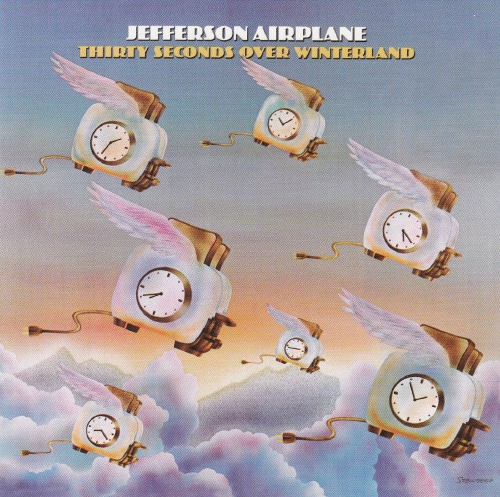

When Jefferson Airplane's second live collection, Thirty Seconds Over Winterland, was released in 1973, no indication was given that it was the band's final LP (until the self-titled one-off 1989 reunion album, that is). But even if fans had known that this was the end of the road for Jefferson Airplane, the disc would have represented more of a stop than a finish. The group toured to support its 1972 studio album, Long John Silver, during the late summer and early fall of the year in a configuration including only two of the original members who had been part of the lineup at their first gig seven years earlier. Those two, singer/songwriter/guitarists Paul Kantner and Jorma Kaukonen, were also the dominant forces in the band on its final tour. Kantner's science fiction anthems, starting with leadoff track "Have You Seen the Saucers," provided one pole, and Kaukonen's blues-rock jams, the major one being the 11-and-a-half-minute "Feel So Good," the other. In between, singer Grace Slick added vocal decoration and Papa John Creach musical decoration with his keening violin, notably on "Milk Train," which they co-wrote. Although erstwhile Quicksilver Messenger Service member David Freiberg was along as a vocalist, he was not a true replacement for the departed Marty Balin, and there was no attempt made to perform a show that summed up Jefferson Airplane. Rather, the show represented the group as it was in 1972, with most of the tracks drawn from the last two albums. The 2009 reissue on the Iconoclassic imprint adds five tracks, expanding the original 36-minute LP into a 66-minute CD. Reissue producer Frank Ursoleo has remained true to the album's initial format by including more material that was contemporary for its time, such as "Diana," a song from the 1971 Kantner/Slick album Sunfighter, and the blues "Come Back Baby," which had appeared on the 1971 album First Pull Up, Then Pull Down by Kaukonen and bassist Jack Casady's spinoff group Hot Tuna (although it also had been in the Jefferson Airplane repertoire for a while, having been played, for example, at Woodstock in 1969). Slick's "Lawman" gives her another showcase, and "Wooden Ships" even allows an opportunity to hear Freiberg (in the third verse) singing solo. So, in this version, Thirty Seconds Over Winterland is a more complete statement of the Jefferson Airplane of 1972, even if it remains a final statement only by happenstance rather than intention.
When Jefferson Airplane's second live collection, Thirty Seconds Over Winterland, was released in 1973, no indication was given that it was the band's final LP (until the self-titled one-off 1989 reunion album, that is). But even if fans had known that this was the end of the road for Jefferson Airplane, the disc would have represented more of a stop than a finish. The group toured to support its 1972 studio album, Long John Silver, during the late summer and early fall of the year in a configuration including only two of the original members who had been part of the lineup at their first gig seven years earlier. Those two, singer/songwriter/guitarists Paul Kantner and Jorma Kaukonen, were also the dominant forces in the band on its final tour. Kantner's science fiction anthems, starting with leadoff track "Have You Seen the Saucers," provided one pole, and Kaukonen's blues-rock jams, the major one being the 11-and-a-half-minute "Feel So Good," the other. In between, singer Grace Slick added vocal decoration and Papa John Creach musical decoration with his keening violin, notably on "Milk Train," which they co-wrote. Although erstwhile Quicksilver Messenger Service member David Freiberg was along as a vocalist, he was not a true replacement for the departed Marty Balin, and there was no attempt made to perform a show that summed up Jefferson Airplane. Rather, the show represented the group as it was in 1972, with most of the tracks drawn from the last two albums. The 2009 reissue on the Iconoclassic imprint adds five tracks, expanding the original 36-minute LP into a 66-minute CD. Reissue producer Frank Ursoleo has remained true to the album's initial format by including more material that was contemporary for its time, such as "Diana," a song from the 1971 Kantner/Slick album Sunfighter, and the blues "Come Back Baby," which had appeared on the 1971 album First Pull Up, Then Pull Down by Kaukonen and bassist Jack Casady's spinoff group Hot Tuna (although it also had been in the Jefferson Airplane repertoire for a while, having been played, for example, at Woodstock in 1969). Slick's "Lawman" gives her another showcase, and "Wooden Ships" even allows an opportunity to hear Freiberg (in the third verse) singing solo. So, in this version, Thirty Seconds Over Winterland is a more complete statement of the Jefferson Airplane of 1972, even if it remains a final statement only by happenstance rather than intention.